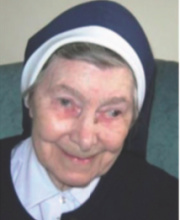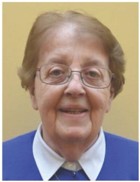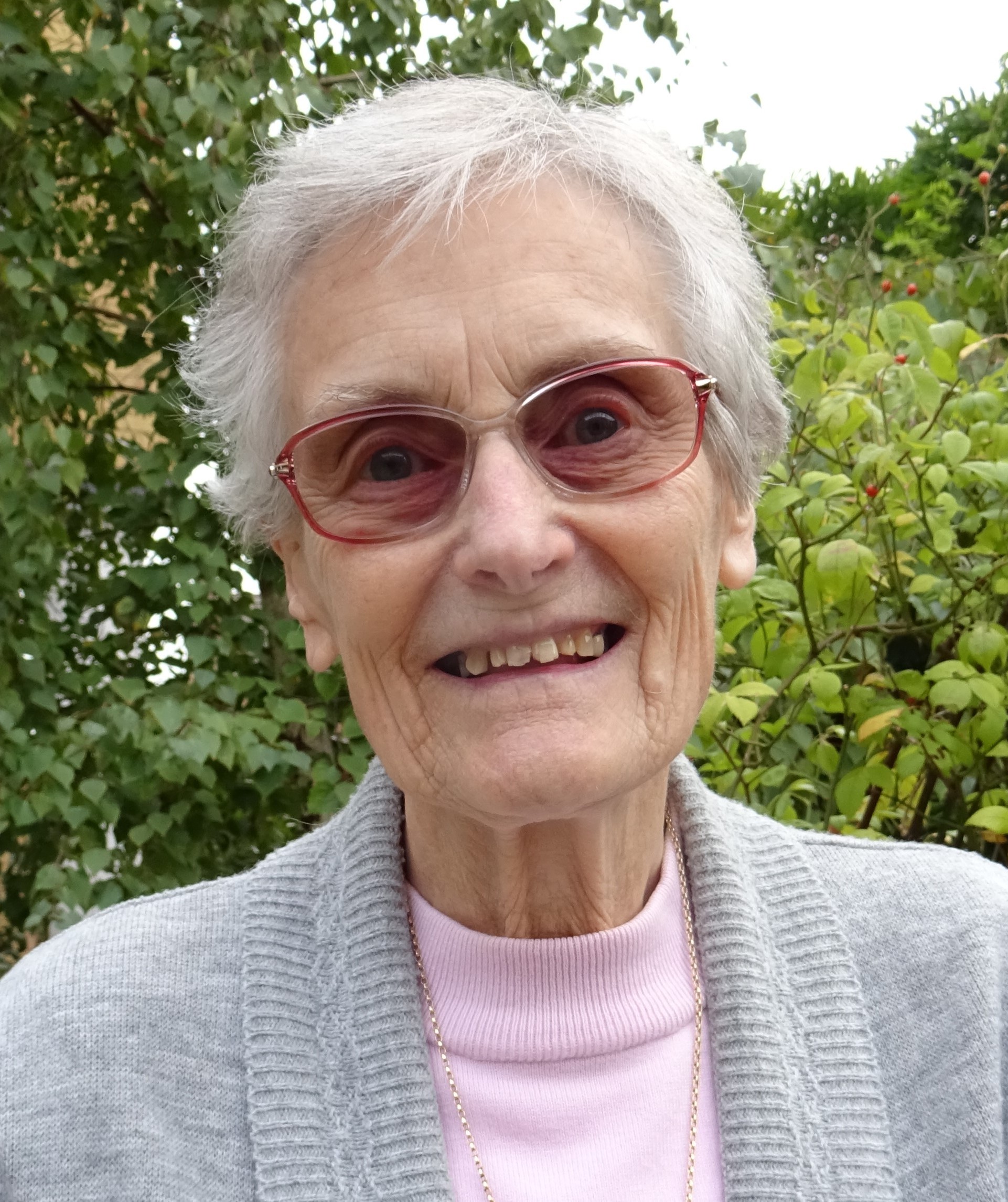
 Sister Mary Sabina Devaney
Sister Mary Sabina Devaney
1918 – 2020
Born: 22nd November 1918
Entered Religious Life: 1st October 1943
Died: 23rd July 2020
Reflection given by Sr. Úna O’Neill, Provincial Leader in the Irish Province at the Funeral Mass for Sr. Sabina
“The time has come for me to go”. The words of St. Paul in the second reading are so very true of the woman whose life we are celebrating today. At almost 102 years of age the time had indeed come for her to go.
Today is the completion of a life history that began on 22nd of November 1918 in Cave, Clarinbridge, when John and Sabina gave birth to a little girl whom they named Mary. She lived through historical and global changes and seismic shifts in the Church and in Religious Life which we can only imagine. For almost 77 years she remained steadfastly faithful to the constant core of who she was as an RSC and her life had its steady centre and focus on Jesus.
She lived all her life in the Irish Province and spent her longest length of time ministering in the Hospice in St. Patrick’s Cork where her gifts of hospitality and caring were lavished on those whom she served – both in the Hospice itself and in the community. Wherever Sabina was, her presence was always kind and compassionate and generous. No doubt she first learnt such hospitality in her home in Clarinbridge.
She loved her family deeply and we thank God today for them and for the many people who have loved her through life, especially her parents, brothers and sisters, nieces and nephews and the many Sisters of Charity who knew her as friend and companion. Today we remember especially Sr. Aloysius – her devoted and beloved sister who will miss her so much.
In the Gospel we are told: “As long as you did it to others you did it to me”. It challenges us to practice what we preach, to be people of integrity, committed to living out the values of Jesus and to the service of God’s people; to build a world where forgiveness and trust, peace and patience will win out most of the time over anger and resentment, oppression and suspicion. That was so true of Sabina. She has given us cause for gladness; she has brought light into the darkness of peoples’ lives; she has shown us that fidelity and selflessness and quiet strength comes from our commitment to Jesus. He was her life, the reason for her living, the joy of her being, the centre of her heart. Because of that her needs were few. Her living was simple. She asked for little. She gave with her whole heart.
The fruit of her life is obvious in the way she lived her last years. Her involvement in ministry and community lessened, her strength diminished, friends and family died, and yet she remained steadfast and peace-filled and gracious.
We live in dark days. These are troubled times for all of us. Each day we face confusion and uncertainty. Sabina knew that. She knew about the virus. She knew that the Nursing Home where she was so content was closing. She knew that life as we knew it would never be the same again. And yet she did not despair. Rather she lived the advice that Mary Aikenhead gave to her Sisters in times of trouble: “Low spirits and dread of evil . . are the beginning of despair. If all the rest of the world goes wrong, we should still persevere in trying to serve God with faith and fervour”.
She was so blest to be in St. Monica’s – first the convent and then the Nursing Home – where she was cared for as she had cared for so many in her lifetime. The staff respected her privacy, ensured her dignity and did everything to comfort her in her growing debility.
Her smile defined her. Her life history was written in that smile. When we reflect on Sabina I think we learn that in times of suffering, controversy, pain and injustice, Jesus alone gives us reason to continue to walk His way with passion and in spite of everything. We must live the Gospel without fear or favour; doing things because they are right, not because we want acknowledgement or praise or gratitude.
In the 1st Reading we heard: “The Lord is the One in whom we hoped. We exult and we rejoice . “ and this is echoed in the second reading where we are advised to put all our hope in God, to place our trust in him, now and evermore. If we do that, trust and hope in God, then He will calm our anxious hearts and reassures us that our lives are worthwhile. He will lead us to places of hope and healing even in the midst of dark and troubled times.
Sabina can now rest from her labours, and we who are left behind can learn from her to keep our faith strong, our hope bright, our hearts honest and our trust in the God of love who has now received Sabina into the fulness of that life and love .
May she rest in peace.
We are standing this morning on holy ground: the place where Mary Aikenhead spent the last years of her life as an invalid – a woman whose vision, courage and practical common-sense gave birth to our Congregation and to our long and graced history of service of the poor, the weak and the vulnerable.Today we are celebrating the life of Sr. Joseph Helen, a woman who cherished that charism, serving those in need with fidelity and generosity, and who also spent the last years of her life here in the Hospice.
The readings this morning are both comforting and challenging.In the Gospel Jesus speaks of himself as the Way, the Truth and the Life.He invites us to put our hope and our trust in Him and in His promise to be with us, steadily and constantly as we try each day to walk his way, to speak his truth, to live his life.It is an apt description of the life and commitment of the woman whom we are remembering here.
In her 103 years of life, Sr. Joseph Helen lived through historical and global changes that are impossible for us to imagine.She experienced seismic shifts in Church and state.She witnessed wars and famines on a world scale.Through all of those yearsshe remained steadfastly faithful to the constant core of who she was as an RSC.She was born Dorothy Cunningham in Ballacolla in Portlaoise on 1st July 1908. She was an only girl, with one brother, and was much loved by all.Her childhood and youth reflected the calm ordinariness of children’s lives at that time.Following her degree studies she spent some months caring for her mother who was ill and then secured a job teaching in Mountjoy St. School in Dublin.Her father was not impressed!His comment on hearing of that place was:“It doesn’t sound like much of a job but you like working for the poor and you’ve always been good at it”.She remained there until she entered the Sisters of Charity on 5th October 1931.
In the first reading we are told that God gives strength to the wearied; that those who hope in Yahweh will soar like eagles, run and no grow weary, walk and never tire.That was so true of J. Helen throughout her active life.She was missioned back to Mountjoy St. after her religious profession and taught there for 12 years.Following a year’s further study in Scotland, she went to teach in a Secondary Modern school inWalthamstow in England for a year.And then came the call to be one of our three founding Sisters of the Zambian Region, or Northern Rhodesia as it then was.
In 1948 they set sail, travelling for four weeks by boat – The Athlone Castle -rail, bus and lorry before arriving in Chisekesi Siding on a dark morning on 28th October 1948. Sr. Helen kept a diary of the journey which was printed for the 50th anniversary and which gives a fascinating insight into their journey and how they coped with, what was for them, such a strange and almost ‘alien’ environment.
One can only imagine the anticipation and anxiety, the challenge and the loneliness, the wonder and the doubts that marked that journey and her first months in Zambia.It was a place and people that she came to love and cherish.She committed herself to the education of girls and brought the gift of knowledge and freedom to countless women who still remember her with gratitude and appreciation.There are many past pupils with sad hearts in Zambia at the moment – their sadness at her passing tempered only by their gratitude that she is free from the debilities of her age.And that mourning is echoed this morning among our sisters there in the Region and here in this Chapel in the sisters who lived with her and shared her life for those 30 years.
Her first 15 years in Zambia were spent in the Teacher training college run by the Jesuits and began her work in promoting the education of girls – beginning with the setting up of a girls secondary boarding school in Roma in Lusaka.Nine years later she was appointed Regional Leader and on Independence day 1978she was conferred with the Order of Distinguished Service for 30 years of outstanding service to the people of Zambia in the fields of Education and Social work.
While she was a formidable woman in many ways, with high standards and expectations, her devotion to her religious life and her commitment to education was recognized and appreciated by all who knew her.She was a strict disciplinarian, spoke the truth without apology and demanded very high standards.At the same time her heart was compassionate and her generosity and hospitality were known and appreciated by all.
Like all of us, Helen has known suffering and joy, tears and laughter, pain and happiness, loneliness and friendship.And she had strong relationships with herfriends – too numerous to mention – but exemplified in the love and devotion of Sr. Mary Bernadette Collins and Catherine Fallon.Up to the end she valued and enjoyed her relationships with her nieces, nephews and other family members and followed their lives with interest, with love and with prayer.
In 1978 she was missioned to Ireland and worked on our Constitutions.Subsequently she was appointed as local leader to our community in Crumlin before her appointment to our Provincial Leadership team and consequent arrival here in Our Lady’s Mount in 1981.
Sr. J. Helen’s commitment to Mary Aikenhead’s charism was single-minded and she never compromised on that.The second reading confirms her attitude to life:nothing outweighs the supreme advantage of knowing Christ Jesus. It is only through Him, with Him and in Him that we can find life and happiness and fulfilment.Rooted in that conviction, she endorsed and embraced anything that served the people for whom she cared in a better, more dignified or respectful way.
She suffered in her growing debility and weakness these last years and all of us – family, community, friends and colleagues – were saddened as we watched her suffering and her struggle to cope.In spite of the wonderful, caring staff who surrounded her and the sisters and friends who were her constant support,she had difficult and dispiriting days.Yet she never gave up .Her faith in Providence was the touchstone of her life.In the midst of all her pain and letting-go she was confident that he was with her, holding her, comforting her and in the end, calling her to himself.And when that call came, sheyielded her spirit to the Lord, peace-filled, calm and trusting – blest with a death that had no struggle, no pain, no fear.And perhaps I can end with some words of hers, written in the diary of which I spoke, on her arrival in Chikuni:“Now that we have reached our Promised Land we must thank God and Our Lady for our very pleasant and on the whole easy journey which we have had . . . . “Those words echo, not only the journey to Chikuni, but her life journey, now at its end as she moves, we believe, into the fullness of the Promised land of God’s life and love.

 Sister Mary Sabina Devaney
Sister Mary Sabina Devaney





